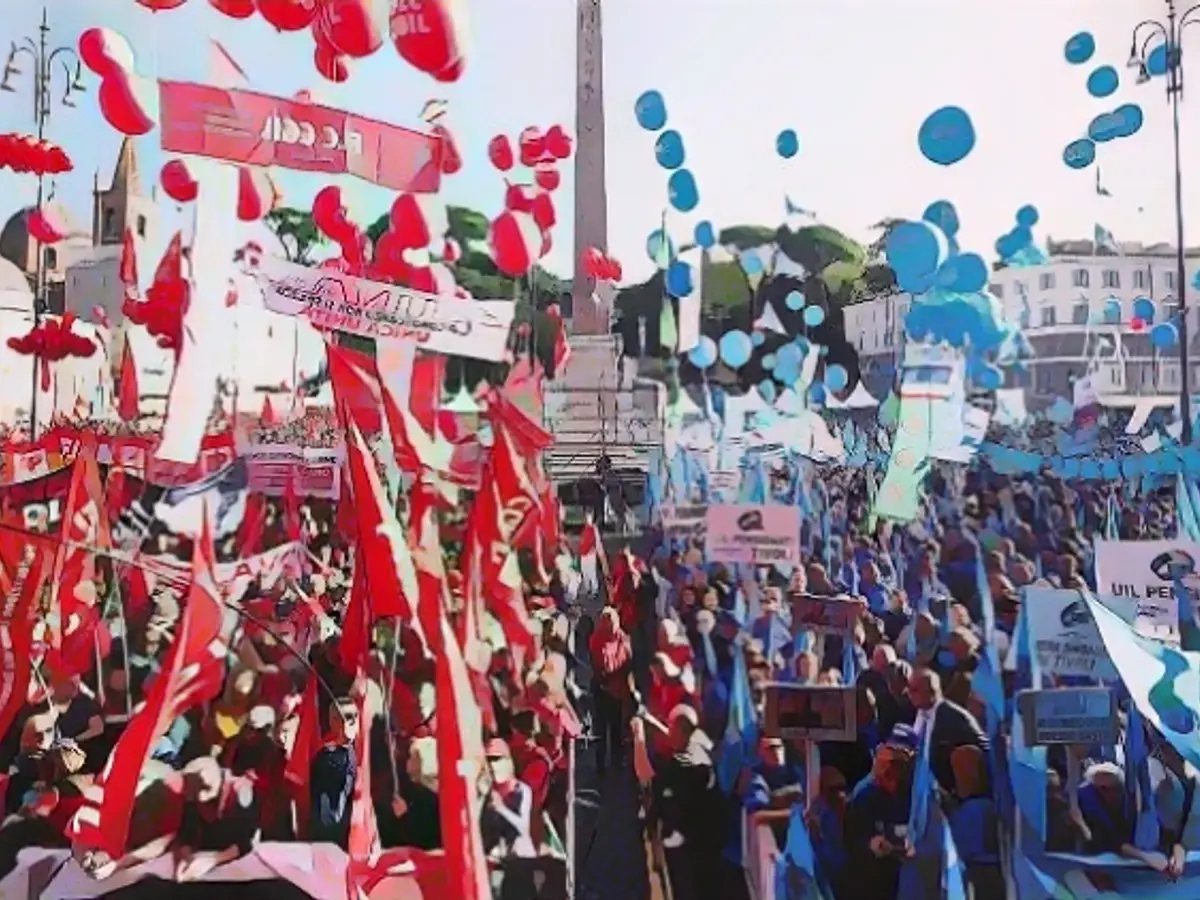Trade unions engage in power struggle with Meloni government
A general strike in Italy turns into a power struggle between trade unions and the right-wing nationalist government. To avoid losing out, the trade unions appeal to Prime Minister Meloni. But someone else is at the center of the dispute.
"Adesso basta!" is the motto of the general strike that filled the Piazza del Popolo in Rome today with people and red and blue flags. The strike was called by the CGIL and UIL trade unions. The strike was originally a protest against the 2024 budget law and a series of promises made by Prime Minister Giorgia Meloni's government that the unions believe have not been kept. In the meantime, the strike has turned into a tough and fundamental confrontation.
The general strike was scheduled to last eight hours and affected the public sector: from local and long-distance transport to schools, hospitals, fire departments and waste collection. The unions are demanding higher salaries and pensions, a renewal of collective agreements, the abolition of discrimination against women in the labor market, a general policy for the younger generation and job security.
Salvini wanted to steal Meloni's thunder
The fact that the strike escalated is primarily due to Lega leader Matteo Salvini, one of the junior partners in Meloni's right-wing coalition. Salvini is Deputy Prime Minister and Minister of Transport and Infrastructure. In order to steal the Prime Minister's thunder, at least for a few days, he is turning the general strike into a major showdown with the trade unions.
Salvini had demanded that the leaders of CGIL and UIL, Maurizio Landini and Pierpaolo Bombardieri, limit the restrictions on trains and public transport to four hours in the morning. As the trade unionists refused, Salvini turned to the parliamentary commission, whose task it is to ensure that the legal right to strike is not curtailed. The commission agreed with Salvini, arguing that it was not a genuine general strike - partly because the private sector was excluded.
When the union nevertheless insisted on the eight hours in local and long-distance transport, Salvini threatened to force employees to turn up for work. He got his way: Landini and Bombardieri announced on Wednesday that they would limit the strike in the two areas to four hours.
From the unions' point of view, the right to strike is in danger
If the unions had defied the minister, not only would they have faced a fine of up to 100,000 euros, but any unruly workers would have been fined up to 1,000 euros. "We would have taken our chances," said Landini, "but we didn't want the workers to pay for a right to which they were entitled."
The trade unions consider Salvini's reasons for threatening to impose a work obligation - a measure that is normally only used in emergencies or because public safety demands it - to be particularly questionable. Bombardieri listed some of the ministry's written justifications: "Tourism in our country, the ever-increasing traffic on the roads and, as these are two of the most important unions, the likely high level of participation."
Landini described Salvini's actions as an attack on the Italian constitution, in which the right to strike is enshrined. Bombardieri, in turn, referred to a development that has indeed been observed for some time: members of the current government often adopt a rather harsh tone in public conflicts.
"We are not afraid!"
Here, too, Salvini is usually at the forefront. Alluding to the strike being set for a Friday, he said that the strikers "want to set themselves up for a long weekend". He also accused Landini and Bombardieri of playing politics under the guise of the labor movement.
While Landini called on Meloni from the stage to defend the right to strike and to listen to the workers, Bombardieri replied to Salvini: "We are not beholden to any party. And yes, we do politics, namely trade union politics."
One of the slogans addressed to the government today was: "We are not afraid!" However, the trade unions are concerned that this government will continue to attempt to curtail the right to strike in the future. Salvini has shown that this is possible.
In response to Salvini's actions, trade unions accuse him of threatening Italy's constitutional right to strike, a right that Prime Minister Giorgia Meloni's government is expected to uphold. Meanwhile, Matteo Salvini, Deputy Prime Minister and Minister of Transport and Infrastructure, has been actively attempting to limit the impact of the general strike, initially pushing for a four-hour restriction on public transportation and threatening to force employees to work if the unions didn't comply.
Source: www.ntv.de








